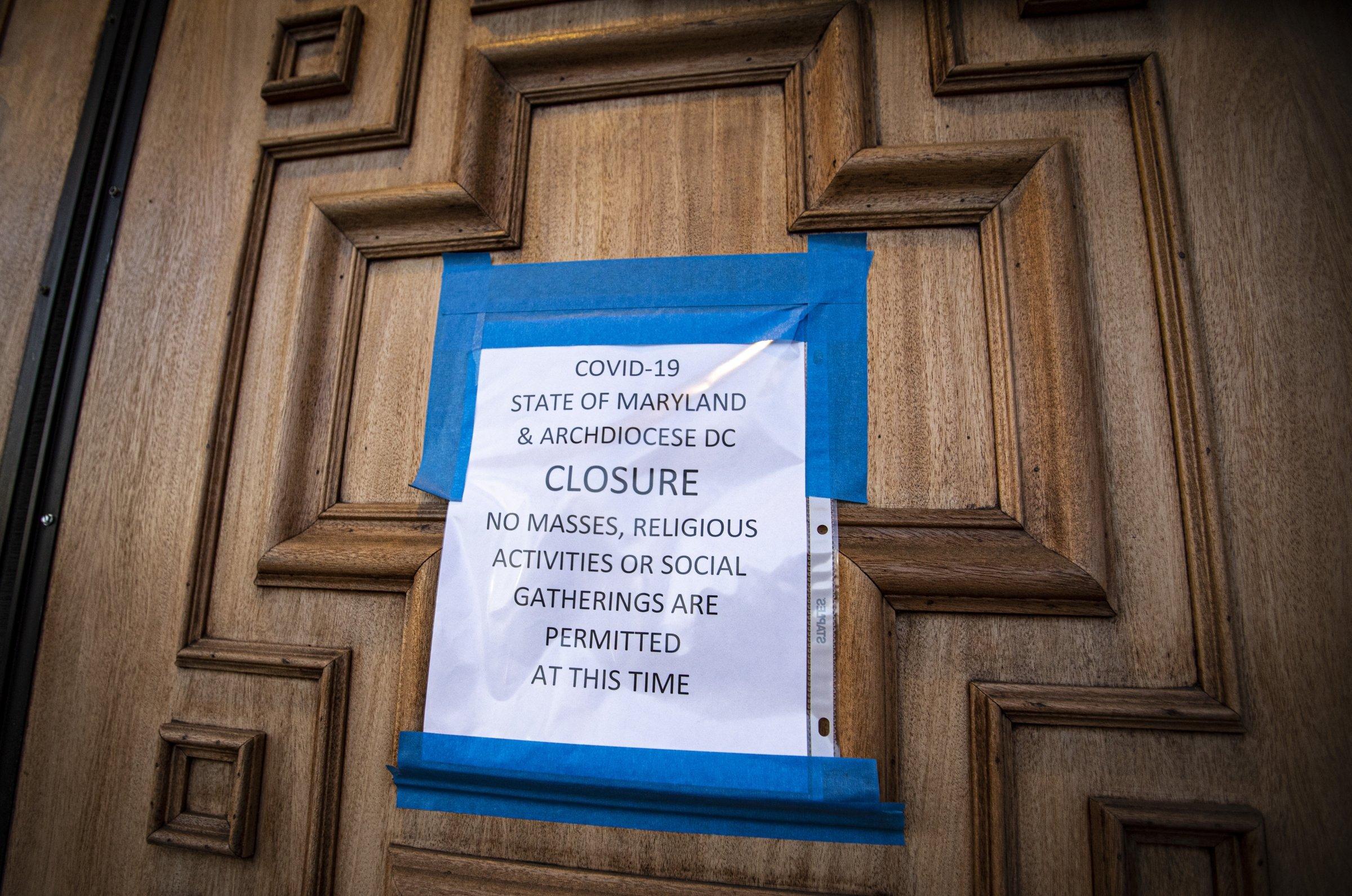
A sign on the door of St. Mary’s Catholic Church in Landover Hills, Md., alerts the public there will be no Sunday Mass March 22, 2020. The U.S. Conference of Catholic Bishops’ Administrative Committee released a pastoral message March 9, 2021, marking one year since the coronavirus pandemic “changed life” and “ushered in suffering” in the United States. (CNS photo/Chaz Muth)
U.S. Conference of Catholic Bishops’ Administrative Committee
U.S. life has “dramatically changed” due to the yearlong coronavirus pandemic, and alongside it, racial injustices and political divisions have shaken the nation, yet there is “comfort in God’s promise,” the U.S. bishops’ Administrative Committee said in a March 9 pastoral message. There also “is much to learn from this global suffering,” it said, adding that going forward, people must build on the many acts of sacrifice and kindness exhibited amid the scourge of COVID-19. March 11 marked one year since the World Health Organization declared COVID-19 a global pandemic, “ushering in immense suffering,” the pastoral message said. To date, 525,000 lives have been lost to the disease just in the U.S., according to data from Johns Hopkins University in Baltimore. Worldwide, the death toll is 2.6 million. “Many have endured extraordinary hardships: sickness, death, mourning, a lack of food, unstable housing, loss of work and income, struggles with education, separation, abuse, isolation, depression and anxiety,” said the message, approved by the U.S. Conference of Catholic Bishops’ Administrative Committee during its virtual meeting. The committee is led by the USCCB president, who is Los Angeles Archbishop José H. Gomez, and is made up of all chairmen of USCCB’s committees and a representative from each U.S. episcopal region. The pastoral message pointed to innumerable “acts of sacrifice” and “acts of kindness” that have helped ameliorate in many ways some of the suffering — physical, emotional and financial — the pandemic has wrought. “We also saw countless acts of sacrifice by health care workers, first responders, chaplains, those who work in our soup kitchens and homeless shelters, mail carriers, agricultural and grocery store workers, friends and even strangers,” the committee said. The message follows.
This month we mark one year since the pandemic dramatically changed life in our country, ushering in immense suffering. Many have endured extraordinary hardships: sickness, death, mourning, a lack of food, unstable housing, loss of work and income, struggles with education, separation, abuse, isolation, depression, and anxiety.
We witnessed racial injustices, the diminishment of the poor and the elderly, and painful divisions in our political life. Yet we know, as the psalms remind us, that we find comfort in God’s promise that gives us life (Ps 119:50).
We also saw countless acts of sacrifice by health care workers, first responders, chaplains, those who work in our soup kitchens and homeless shelters, mail carriers, agricultural and grocery store workers, friends and even strangers.
Countless acts of kindness were offered by so many people, which served to remind us that we are all in this together. For all these acts of sacrifice, we are very grateful. We are also very grateful to our priests, deacons, religious, teachers, catechists and lay ecclesial ministers who have ministered to the people of God during these difficult times.
In the pandemic, God has once more revealed us to ourselves. As Pope Francis reminded us in St. Peter’s Square last year, we are not as powerful or as in control as we thought.1 Rather than being ashamed of this powerlessness or crushed by the fear of what we cannot control, our interconnectedness and dependence on God has been revealed. As Christians, this is a very familiar lesson: St. Paul reminds us to bear one another’s burdens, and so you will fulfill the law of Christ (Gal 6:2). And that law is the law of love.
The pandemic has also revived our sense that we are a global community, and that each of us is indeed each other’s keeper. While the growing availability of vaccines is a clear sign of hope that this pandemic, too, will pass, that hope must be given to every human being on the planet by making the vaccines universally available. Richer nations and pharmaceutical companies must work together to ensure that no nation, no person is left behind.
There is so much to learn from this global suffering. We must build on the kindness and openness that we have witnessed on the local level by creating more social structures that not only heal the fractures and isolation felt by so many during this pandemic but will prevent such divisions from occurring again.
As Pope Francis has implored, “Let us dream, then, as a single human family,”2 to a horizon where we are more caring of one another. Let us keep this sense alive and continue the work of promoting the common good.
Renewed by this season of Lent, we, the members of the Administrative Committee, place our confidence in the Lord, who suffered, was crucified and is resurrected. We join our brother bishops in urging everyone to continue to keep God’s love alive in their hearts and in their families and communities.
And we look forward to welcoming the Catholic faithful back when we all may safely participate physically in the eucharistic celebration of the Mass and gather once more in our parishes.
Notes
1 See Pope Francis, “Extraordinary Moment of Prayer” (March 27, 2020). http://www.vatican.va/content/francesco/en/homilies/2020/documents/papa-francesco_20200327_omelia-epidemia.html
